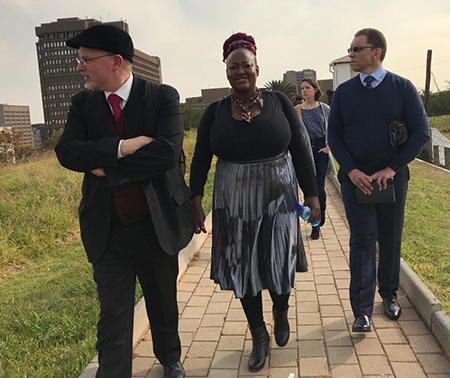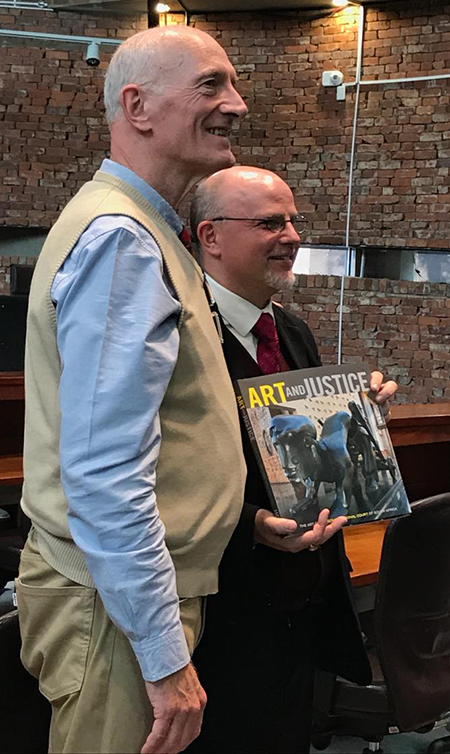On 27 May a contingent of 14 North-West University (NWU) academics and students were hosted by the Constitutional Court art collection curator Francois Lion-Cachet and Justice Edwin Cameron, who has served for over 10 years as a Justice of the Court.
The group of students included the chairpersons of student LGBTIQ+ societies at the NWU. Organised by the university’s Gender Benefit Network, the visit included a tour of the Old Fort Prison, with an account of the many famous persons detained there during the apartheid period, including Nelson Mandela.
The art collection, comprising some 600 works, features dozens of artworks by prominent South Africa sculptors and artists whose work dates from the post-apartheid era.
The links between the Constitutional Court and the NWU are strong. For example, current NWU gallery and art collection curator Amohelang Mohajane, who accompanied the group, was formerly employed by the Constitution Hill Development Company. In addition, Francois Lion-Cachet, presently the art curator at Constitutional Court, was formerly attached to the NWU’s gallery.
In addition, the NWU conferred honorary doctorates on Chief Justice Pius Nkonzo Langa in 2011 and Chief Justice Mogoeng Mogoeng in 2013.
A moving engagement
“The address by and engagement with Justice Edwin Cameron was deeply moving,” says Prof Robert Balfour, NWU deputy vice-chancellor for teaching and learning, who accompanied the group.
Justice Cameron is well known for being one of the authors of the submissions concerning LGBTIQ+ rights, made to the then drafters of the South African Constitution. He has also published on aspects of identity with Mark Gevisser (1995) Defiant Desire: Gay and Lesbian Lives in South Africa, and went one to become one of the leading activists concerning HIV/Aids, publishing Witness to Aids in 2005. In this book the impact of HIV/Aids on the population is described, and a case is argued for the state’s obligations to provide access to treatment to all infected people in South Africa.
During the visit, Justice Cameron gave an account of how the rights of LGBTIQ+ people came to be recognised and established within South Africa's Constitution.
This happened through the examples of activism, defiance and leadership of individuals who were part of the anti-apartheid struggle, and whose open testimony regarding their sexual orientation and identity ensured that such recognition was made visible in the Constitution. That paved the way for the many seminal court cases giving further expression to LGBTIQ+ rights to equality.
Coming out is a personal decision
Justice Cameron argued that a critical point in the liberation of people identifying as LGBTIQ+ is the act of “coming out”, but that each decision to come out is personal since it instrumentalises a life towards a particular end. He described the examples of Simon Nkoli (1957-1998) and also spoke to his own coming out as HIV+ and the risks, vulnerability and also courage associated with these choices, whether for people LGBTIQ+ or not.
In this regard Justice Cameron commended the university on supporting students and staff through bodies such as the Gender Benefit Network, which is a network of members of the NWU who provide financial and other support for the student societies on the three campuses.
He said student life was important area of university life in which to raise awareness. Recognising that sexual orientation is an important aspect of identity, diversity and inclusion, is not a once-off action or realisation, but is ongoing.
Struggling for equality
"Humanity is diverse and richer than the simplicity that anyone can force upon it. The struggle for equality is a beautiful struggle, a worthwhile struggle not just for ourselves, but for our societies and for the future. Our visibility is the key to claiming our dignity, our entitlement, our equality and this is happening across Africa."
Justice Cameron said that the struggle for equality remains difficult. Throughout the world, especially in Africa, there are many examples of countries where oppression, victimisation and marginalisation of gay people is perpetrated by the state through the judiciary and other arms of government, leading to the criminalisation of sexual orientation and very often, the abuse of human rights.
The visit concluded with a question and answer session during which Justice Cameron presented Prof Balfour, for the office of the vice-chancellor, with a book in which the Constitutional Court’s art collection features. The book is inscribed by Justice Cameron, and addressed to NWU staff and students. Justice Cameron is due to retire from the Court in August 2019.

Deputy vice-chancellor for teaching and learning Prof Robert Balfour (left) recently accompanied a group of NWU academics and students to the Constitutional Court.
With him in front are NWU gallery and art collection curator Amohelang Mohajane (centre) and Dr Jacques Rothmann from Sociology. Their visit included a tour of the Old Fort Prison where many famous people, including Nelson Mandela, were detained during the apartheid period.

Justice Edwin Cameron (centre), together with Constitutional Court art collection curator Francois Lion-Cachet (far right), hosted 14 people from the NWU at the Constitutional Court.

Justice Edwin Cameron presents Prof Robert Balfour with Art and Justice, a book featuring the Constitutional Court’s art collection.
